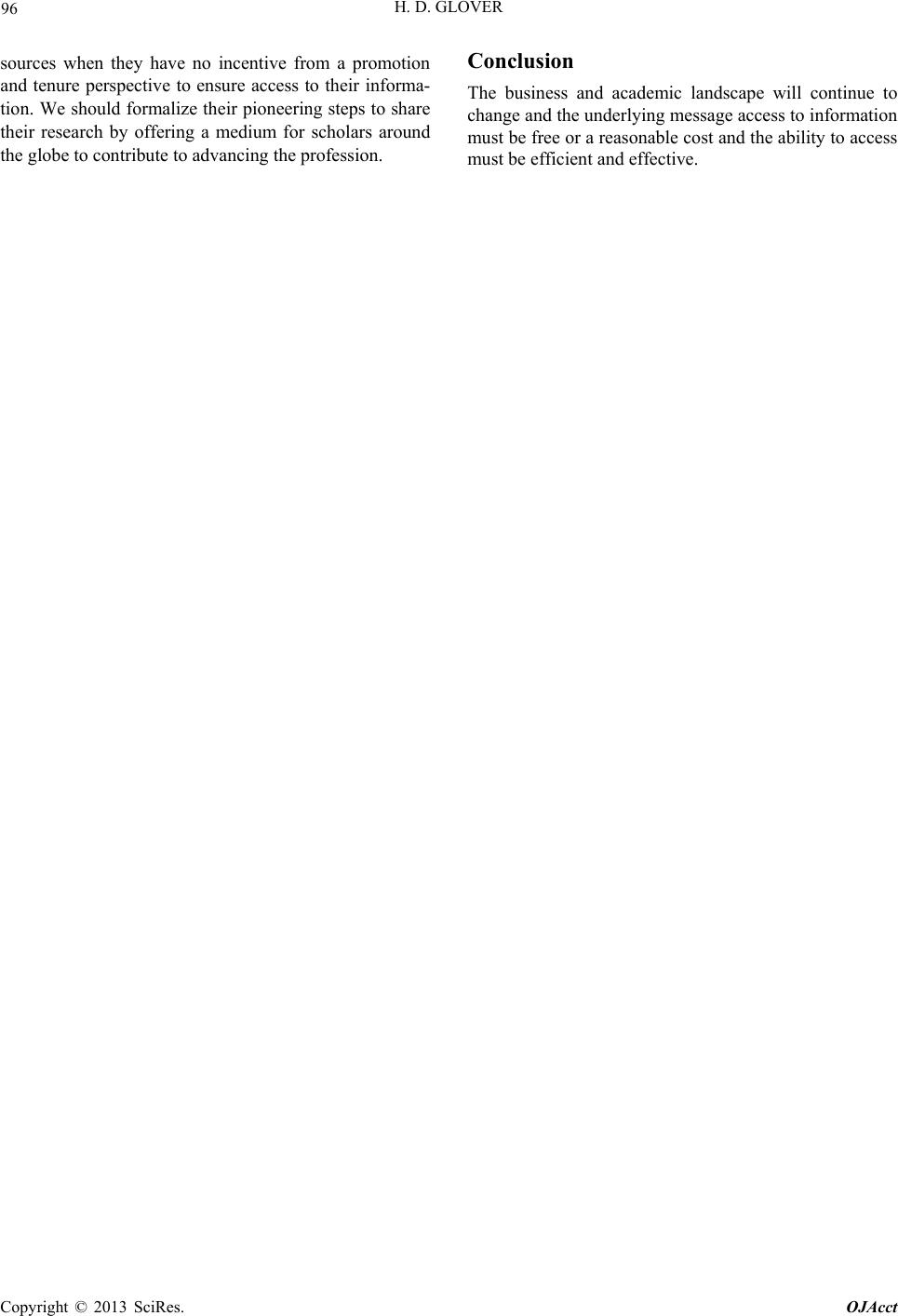Paper Menu >>
Journal Menu >>
 Open Journal of Accounting, 2013, 2, 95-96 http://dx.doi.org/10.4236/ojacct.2013.24012 Published Online October 2013 (http://www.scirp.org/journal/ojacct) Academia Should Embrace Open Access Scholarly Publishing Hubert D. Glover Department of Accounting, LeBow College of Business, Drexel University, Philadelphia, USA Email: hdg26@drexel.edu Received July 15, 2013; revised August 21, 2013; accepted September 1, 2013 Copyright © 2013 Hubert D. Glover. This is an open access article distributed under the Creative Commons Attribution License, which permits unrestricted use, distribution, and reproduction in any medium, provided the original work is properly cited. Dear Editor, During the early part of the 21st Century, AT&T and Verizon noted that revenue from traditional residence based land lines had been surpassed by wireless revenues. Likewise, Amazon noted just a few years ago a similar milestone when e-books surpassed paper books’ reve- nues. PC manufacturers such as HP are seeking declines in sales while mobile phone manufactures such as Sam- sung experience significant sales increase as more con- sumers globally access the internet via mobile connec- tions. Similarly more and more of the millions of stu- dents enrolled around the world today take courses in some form of online education or Massive Online Open Courses (MOOCs). When I was working on my doctorate at Texas A&M University I represented my department at the annual accounting doctoral student symposium hosted by Deloitte in 1991. During that symposium the late Alvin Arens noted that the emergence of information technology was closing the gap between larger and smaller academic institutions. Arens notes that the inherent resource dif- ference is mitigated by technology such as electronic databases with journal articles or financial information. Thereby, allowing faculty and doctoral students to con- duct similar lines of inquiry despite the size of the insti- tution. My co-author in a recently published book “Giraffes of Technology: The Making of the Twenty-First Leader” notes that technology provides a democratization of in- formation. In other words from the most rural and lower socio economic level to the most developed and affluent groups, information is equally available. Finally, I recall submitting a proposal regarding the consolidation of university resources into one central elec - tronic database and the elimination of paper subscriptions in 1994 at my first academic institution. The proposal was soundly rejected as it was premature. However, to- day, many colleges have reorganized their libraries to be part of the their information resources group, eliminated or greatly reduced paper based subscriptions and replaced with enterprise or bulk electronic subscriptions and ac- cess to mainstream and proprietary databases are a prior- ity if not the norm. The economy has become clearly global as the reces- sion that began in 2007 had an effect throughout the wo rld as markets due to technology and trade are interconnect ed as never before. Just look at the US stock markets that ebb and flow on the economic reports from China to Greece. Today more than 100 companies have adopted International Financial Reporting Standards (IFRS) and many more will adopt in the future. The former G2 is now G20 and growing. Our scholarly activities should mirror the global mar- ket trends. I have sat on the boards of the American In- stitute of Certified Public Accountants (AICPA) and In- stitute of Management Accountants (IMA) who now have significant global strategies. I am also serving on the finance committee for the American Accounting Asso- ciation (AAA) which has more than a third of its mem- bership is internatio nal. Thus, I am excited about the latest trend in academic publishing which is open access. Some of our leading and prolific business scholars are now paying for open access to their articles. Despite their publication in tier one journal, I asked one of these leading scholars in ac- counting why he elected to pay thousands for open ac- cess and he noted “our goal is to advance the profession by contributing to the body of knowledge… hence it is essential that as many as possible access this contribution to generate an organic and dynamic response….” The launching of the Open Journal of Accounting is an innovative step to facilitating the requisite exchange of ideas, contributions to the body of knowledge and the access to best practices in research, pedagogy and other key issues facing our profession. Leading scholars are willing to expend financial re- C opyright © 2013 SciRes. OJAcct  H. D. GLOVER 96 sources when they have no incentive from a promotion and tenure perspective to ensure access to their informa- tion. We should formalize their pioneering steps to share their research by offering a medium for scholars around the globe to contribute to advancing the profession. Conclusion The business and academic landscape will continue to change and the underlying message access to information must be free or a reasonable cost and the ability to access must be efficient and effective. Copyright © 2013 SciRes. OJAcct |

